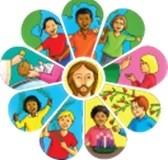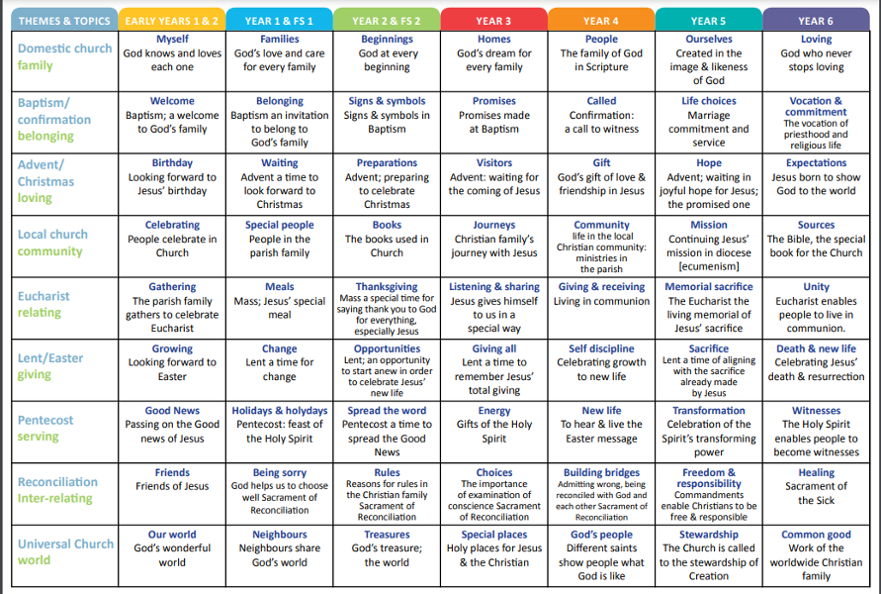Religious Education
Religious Education is at the heart of our curriculum and is a core subject in our school. We aim to develop pupils' religious literacy, knowledge and understanding of their faith by teaching the curriculum as laid down in the Catholic Education Services Curriulum Directory by following the 'Come and See' Religious Education programme.
10% of curriculum time across the school is dedicated to the teaching of RE which we teach from the guidance of the RE Curriculum Directory. We approach the Catholic Primary Religious Curriculum using 'Come and See' scheme which is supplemented by other sources recommended by the Diocese to ensure full coverage of the RE Curriculum Directory.
‘Come and See’ is the response Jesus gave the disciples when they asked, "Where do you live?" (John 1:39). So the programme is based on the truth revealed by God about ourselves, our life together and our ultimate destiny with God. Pupils are invited to develop in faith through study and prayer and to ‘Come and See’ the wonder of all that is within them and beyond them
Throughout a range of topics, children are exposed to the mystery of God, the teachings of Jesus Christ and the Church, lives of Saints, the Sacraments and the relationship between faith and life. These are explicitly taught in RE, though we develop and encourage them through our the Catholic Life and Collective Worship.
Our RE curriculum follows three themes - Church, Sacrament and Christian Living. These are explored at different stages throughout the year:.
Church: These themes take place each term and each theme gradually builds on the pupils' prior learning from the previous topic. Children will explore 'Family', 'Local Community' and 'Universal Church' within this topic.
Sacrament: We explore a Sacramental topic once per term. Children will learn about all seven Sacraments throughout their primary journey (Baptism, Reconciliation, Eucharist, Confirmation, Marriage, Holy Orders and the Sacrament of the Sick). We understand these as meeting points, where God Himself is present, waits for you, blesses you and leads you deeper into the community of the Church.
Christian Living: Children will learn about Advent (celebrating life), Lent and Easter (the cost of life) and Pentecost (feasts to celebrate).
We are committed to providing the children with the rich and varied learning opportunities that will help them to be able to deepen their knowledge and understanding of the Catholic faith.
Multi-faith Programme
As part of the ‘Come and See’ R.E. programme all children study a different world faith for two weeks of the year, Judaism and Sikhism wil be studied during the academic year 2023-2024 (CYcle B) which will be followed by Judaism and Islam in 2024 - 2-25 (Cycle A).
Guests from these religions are invited to share their experiences and artefacts of their faith with the whole school to help our pupils gain a thorough understanding of other religions.This enables the children to have an understanding of what life is like for a child of another faith by the time they leave us.
Big Questions
In partnership with Come and See, we incorporate ‘Big Questions’ into our units of learning throughout the year.
These questions such as ‘What makes a house a home?’ allow children more opportunities to reflect on the meaning of RE teaching in their lives. It also provides scope for discussion and further exploration of key concepts, which link directly to the themes of Come and See.
Why do we ask Big Questions?
-
To encourage children to think beyond the obvious.
-
To encourage children to think of as many possibilities as they can, before deciding upon the best or most appropriate answer.
-
To increase their understanding of a topic
-
To encourage children to articulate their thoughts?
Please see attached an overview of our 'Big Questions' below.
|
|
Big Questions Overview | [pdf 437KB] |
|


